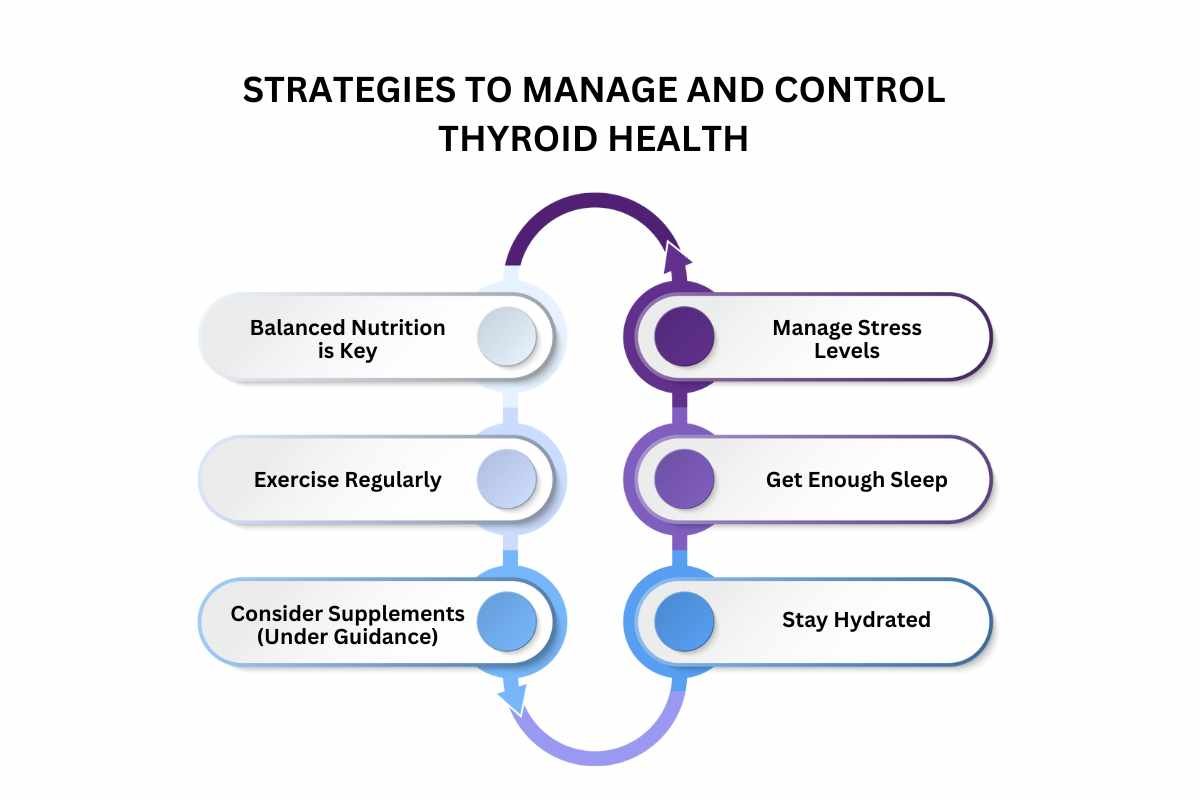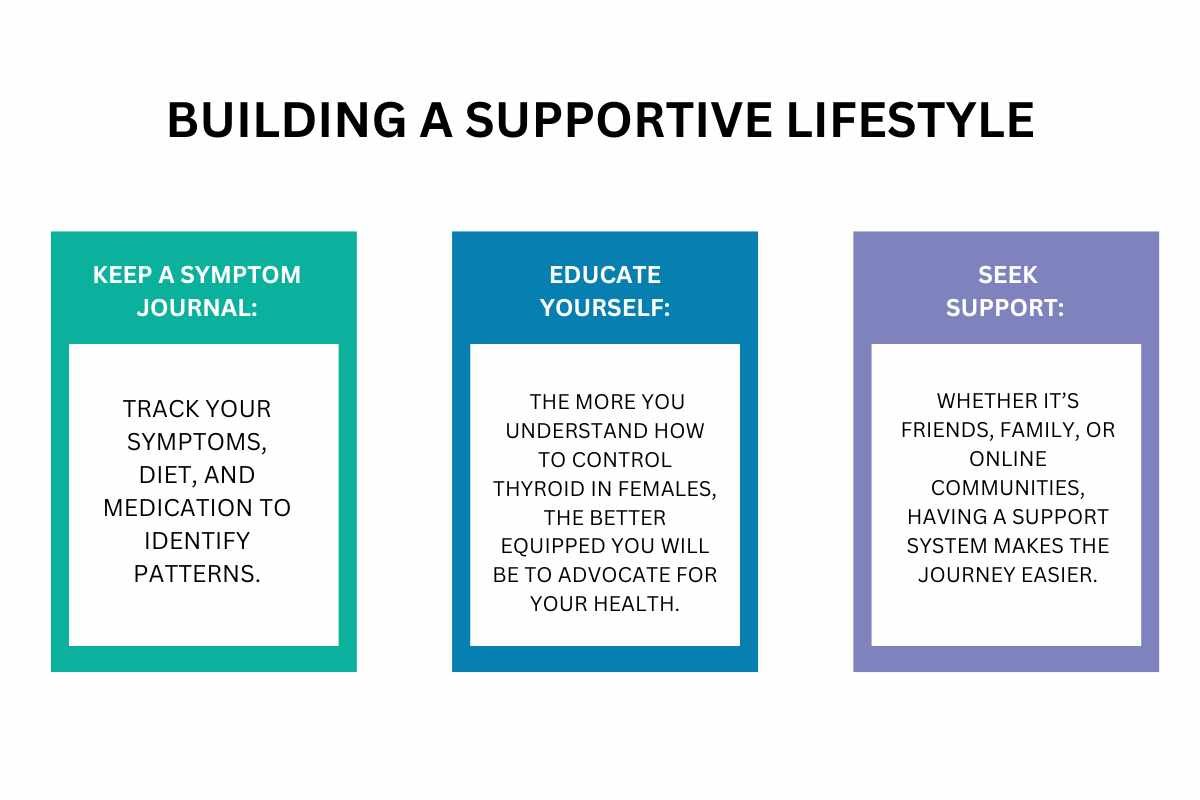Thyroid disorders are increasingly common, especially among young women. It impacts physical health, emotional health, well-being, and overall quality of life. With early diagnosis and consistent care, managing thyroid becomes easier.
In this blog, we’ll understand how to control thyroid in females. Let’s discuss lifestyle adjustments, dietary choices, and medical interventions to keep your thyroid healthy.
What is the Thyroid Gland?
The thyroid is a butterfly-shaped gland located in the neck that produces hormones regulating metabolism, energy levels, and other bodily functions. Two symptoms can be caused when the thyroid produces too much or too little hormone.
- Hypothyroidism: Underactive thyroid can cause fatigue, weight gain, and depression.
- Hyperthyroidism: An overactive thyroid can lead to symptoms like weight loss, anxiety, and rapid heartbeat.
One can suffer from thyroid due to genetics, stress, diet, and autoimmune conditions. Women with hormonal fluctuations during puberty, pregnancy, and menopause make them prone to thyroid. Women must know how to control their thyroid in females. This will help them navigate challenges with confidence.
Signs You May Have a Thyroid Issue
Unexpected Weight changes:
Hair thinning or hair loss
Here are some common symptoms of thyroid that one should take care of:
- Persistent fatigue despite adequate sleep
- Unexpected weight changes (gain or loss)
- Hair thinning or hair loss
- Sensitivity to cold or heat
- Irregular or heavy periods
- Mood swings, anxiety, or depression
If you experience any of these symptoms, you can consult a healthcare provider. Women and men must understand these symptoms beforehand so that they can avoid or keep the thyroid in control.
Strategies to Manage and Control Thyroid Health

1. Balanced Nutrition is Key
The foundation of thyroid health is a well-rounded diet. Certain nutrients directly support thyroid function, while others may interfere. Here is how you can include food in your diet.
- Include Iodine-Rich Foods: The thyroid relies on iodine to produce hormones. Incorporate iodized salt, seafood, and dairy products in your meals.
- Consume Selenium and Zinc: These minerals help to maintain the thyroid hormone levels. Brazil nuts, sunflower seeds, lentils, and whole grains are excellent sources.
- Boost Omega-3 Intake: Fatty fish, walnuts, and flaxseeds are anti-inflammatory and beneficial for thyroid health.
- Avoid Goitrogens in Excess: Foods like cabbage, broccoli, and soy can interfere with thyroid hormone production when eaten raw.
Adopting a nutrient-rich diet is one of the simplest steps in how to control thyroid in females.
2. Manage Stress Levels
Chronic stress negatively affects the thyroid by disrupting hormone production. Practice mindfulness techniques like meditation, yoga, or deep breathing exercises. Taking time to de-stress daily can significantly improve your thyroid health.
3. Exercise Regularly
Physical activity boosts metabolism and supports hormonal balance. For women with hypothyroidism, exercises like walking or swimming are great. In cases of hyperthyroidism, focus on gentler forms like yoga or tai chi.
Finding a workout routine that suits your energy levels is crucial in learning how to control your thyroid in females.
4. Get Enough Sleep
Rest is essential for hormone regulation. Aim for 7-9 hours of quality sleep every night. Poor sleep increases stress and can disrupt thyroid function. Have a relaxed bedtime routine, and see to it your body gets the rest it needs.
5. Consider Supplements (Under Guidance)
While a healthy diet provides most nutrients, supplements like vitamin D, B-complex vitamins, or iodine may be necessary for some women. Always consult your doctor before starting any supplements, as excess intake can sometimes do more harm than good.
6. Stay Hydrated

Dehydration can strain the body’s systems, including the thyroid. Drink at least 8-10 glasses of water daily to support cellular health and toxin elimination.
Medical Interventions
For women diagnosed with thyroid disorders, medical treatment is necessary. Here’s what you need to know:
- Medications: Synthetic hormones like levothyroxine (for hypothyroidism) or antithyroid medications (for hyperthyroidism) are commonly prescribed. Taking them as directed is a critical aspect of how to control thyroid in females.
- Regular Checkups: Monitoring your thyroid levels through blood tests ensures that your treatment plan remains effective.
- Surgery or Radioactive Iodine Therapy: In severe cases, these options may be considered, but they are typically the last option.
Hormonal Health and the Thyroid
Understanding the link between hormonal changes and thyroid health is important for women. Hormones fluctuate a lot in pregnancy and menopause. All of which can affect thyroid function. During pregnancy, a woman’s thyroid has to work harder to support the baby’s development. A woman must consult an endocrinologist in such a major life to enjoy a healthy lifestyle.
Building a Supportive Lifestyle

Thyroid issues require long-term commitment, and building a healthy lifestyle is a must. Here are some ways to keep your lifestyle healthy.
- Keep a Symptom Journal: Track your symptoms, diet, and medication to identify patterns.
- Educate Yourself: The more you understand how to control thyroid in females, the better equipped you will be to advocate for your health.
- Seek Support: Whether it’s friends, family, or online communities, having a support system makes the journey easier.
Final Thoughts
Thyroid health care for both men and women includes a mix of dietary choices and stress management. During these conditions, women and men should take medical consultancy. By changing towards a healthy lifestyle, one can lead a fulfilling life. We hope this blog has given you valuable insights about how to control thyroid in females.
Remember, your thyroid isn’t just a gland—it’s the powerhouse behind your body’s energy.








